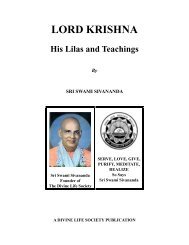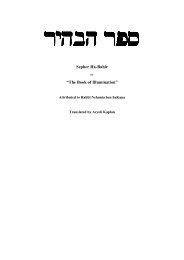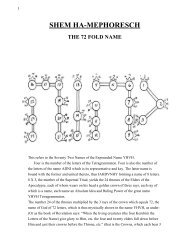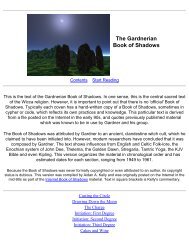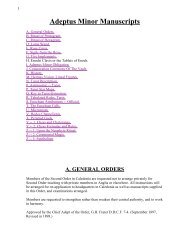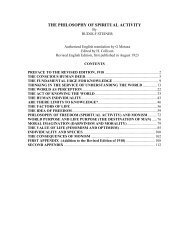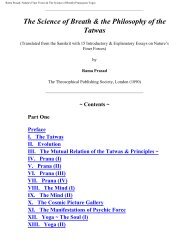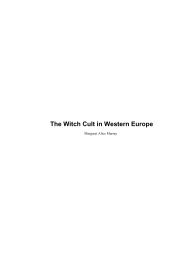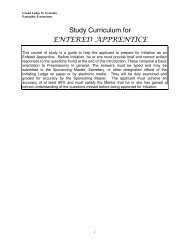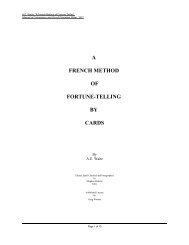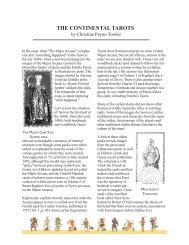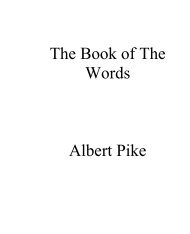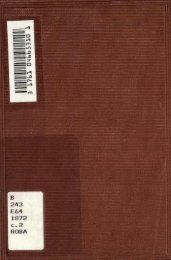Band 2 Anthropogenesis - H.P. Blavatsky
Band 2 Anthropogenesis - H.P. Blavatsky
Band 2 Anthropogenesis - H.P. Blavatsky
Create successful ePaper yourself
Turn your PDF publications into a flip-book with our unique Google optimized e-Paper software.
Thus let it be. No disbeliever who takes the "Secret Doctrine" for a "hoax" is forced or even asked to credit our<br />
statements. These have already been proclaimed to be such by certain very clever American journalists before even the<br />
work went to press.*<br />
Nor, is it after all, necessary that any one should believe in the Occult Sciences and the old teachings, before one knows<br />
anything or even<br />
[[Footnote(s)]] -------------------------------------------------<br />
* So far back as July, 1888, at a time when the MSS. of this work had not yet left my writing table, and the Secret Doctrine<br />
was utterly unknown to the world, it was already being denounced as a product of my brain and no more. These are the<br />
flattering terms in which the Evening Telegraph (of America) referred to this still unpublished work in its issue of June 30,<br />
1888: "Among the fascinating books for July reading is Mme. <strong>Blavatsky</strong>'s new book on Theosophy . . . (!) the SECRET<br />
DOCTRINE. . . . But because she can soar back into the Brahmin ignorance . . . (! ?) . . . is no proof that everything she<br />
says is true." And once the prejudiced verdict given on the mistaken notion that my book was out, and that the reviewer<br />
had read it, neither of which was or could be the case, now that it is really out the critic will have to support his first<br />
statement, whether correct or otherwise, and thus get out of it, probably by a more slashing criticism than ever.<br />
------------------------------------------------------------------------<br />
[[Vol. 2, Page]] 442 THE SECRET DOCTRINE.<br />
believes in his own soul. No great truth was ever accepted a priori, and generally a century or two passed before it began<br />
to glimmer in the human consciousness as a possible verity, except in such cases as the positive discovery of the thing<br />
claimed as a fact. The truths of to-day are the falsehoods and errors of yesterday, and vice versa. It is only in the XXth<br />
century that portions, if not the whole, of the present work will be vindicated.<br />
It is no fact going against our statements, therefore, even if Sir John Evans does affirm that writing was unknown in the<br />
stone age. For it may have been unknown during that period in the Fifth Aryan race, and have been perfectly known to<br />
the Atlanteans of the Fourth, in the palmy days of their highest civilization. The cycles of the rise and fall of the nations<br />
and races are there to account for it.<br />
If told that there have been cases before now of forged pseudographs being palmed off on the credulous, and that our<br />
work may be classed with Jacolliot's "Bible in India" (in which, by the way, there are more truths among its errors than are<br />
found in the works of orthodox and recognized Orientalists) -- the charge and comparison will dismay us very little. We<br />
bide our time. Even the famous "Ezour-Veda" of the last century, considered by Voltaire "the most precious gift from the<br />
East to the West," and by Max Muller "about the silliest book that can be read," is not altogether without facts and truths<br />
in it. The cases when the a priori negations of specialists became justified by subsequent corroborations form but an<br />
insignificant percentage of those that were fully vindicated by subsequent discoveries, and confirmed to the great dismay<br />
of the learned objectors. "Ezour Veda," was a very small bone of contention compared with the triumph of Sir William<br />
Jones, Anquetil de Perron, and others in the matter of Sanskrit and its literature. Such facts are recorded by Professor<br />
Max Muller himself, who, speaking of the discomfiture of Dugald Stewart and Co. in connection with this, states that "if the<br />
facts about Sanskrit were true, Dugald Stewart was too wise not to see that the conclusions drawn from them were<br />
inevitable. He therefore denied the reality of such a language as Sanskrit altogether, and wrote his famous essay to prove<br />
that Sanskrit had been put together after the model of Greek and Latin, by those arch-forgers and liars, the Brahmans,<br />
and that the whole of Sanskrit literature was an imposition" (Science of Language, p. 168). The writer is quite willing and<br />
feels proud to keep company with these Brahmans, and other historical "liars," in the opinion of our modern Dugald<br />
Stewarts. She has lived too long, and her experience has been too varied and personal, for her not to know at least<br />
something of human nature. "When you doubt, abstain," says the wise Zoroaster,<br />
------------------------------------------------------------------------<br />
[[Vol. 2, Page]] 443 PARADOXES OF SCIENCE.<br />
whose prudent aphorism is found corroborated in every case by daily life and experience. Yet, like St. John the Baptist,<br />
this sage of the past Ages is found preaching in the desert, in company with a more modern philosopher, namely Bacon,<br />
who offers the same priceless bit of practical Wisdom. "In contemplation," he says (in any question of Knowledge, we<br />
add), "if a man begin with certainties, he shall end in doubts; but if he will be content to begin with doubts, he shall end in<br />
certainties."<br />
With this piece of advice from the father of English Philosophy to the representatives of British scepticism we ought to<br />
close the debate, but our theosophical readers are entitled to a final piece of Occult information.<br />
Enough was said to show that evolution in general, events, mankind, and everything else in Nature proceed in cycles. We<br />
have spoken of seven Races, five of which have nearly completed their earthly career, and have claimed that every Root-<br />
Race, with its sub-races and innumerable family divisions and tribes, was entirely distinct from its preceding and<br />
succeeding race. This will be objected to, on the authority of uniform experience in the question of Anthropology, and<br />
Ethnology. Man was -- save in colour and type, and perhaps a difference in facial peculiarities and cranial capacity -- ever<br />
the same under every climate and in every part of the world, say the Naturalists: ay, even in stature. This, while<br />
maintaining that man descends from the same unknown ancestor as the ape, a claim that is logically impossible without<br />
an infinite variation of stature and form, from his first evolution into a biped. The very logical persons who maintain both<br />
propositions are welcome to their paradoxical views. Once more we address only those who, doubting the general<br />
derivation of myths from "the contemplation of the visible workings of external nature" . . . . think it, "less hard to believe<br />
that these wonderful stories of gods and demi-gods, of giants and dwarfs, of dragons and monsters of all descriptions,<br />
are transformations, than to believe them to be inventions." It is only such "transformations" in physical nature, as much<br />
as in the memory and conceptions of our present mankind, that the Secret Doctrine teaches. It confronts the purely<br />
speculative hypotheses of modern Science, based upon the experience and exact observations of barely a few centuries,<br />
with the unbroken tradition and records of its Sanctuaries; and brushing away that tissue of cobweb-like theories, spun in



